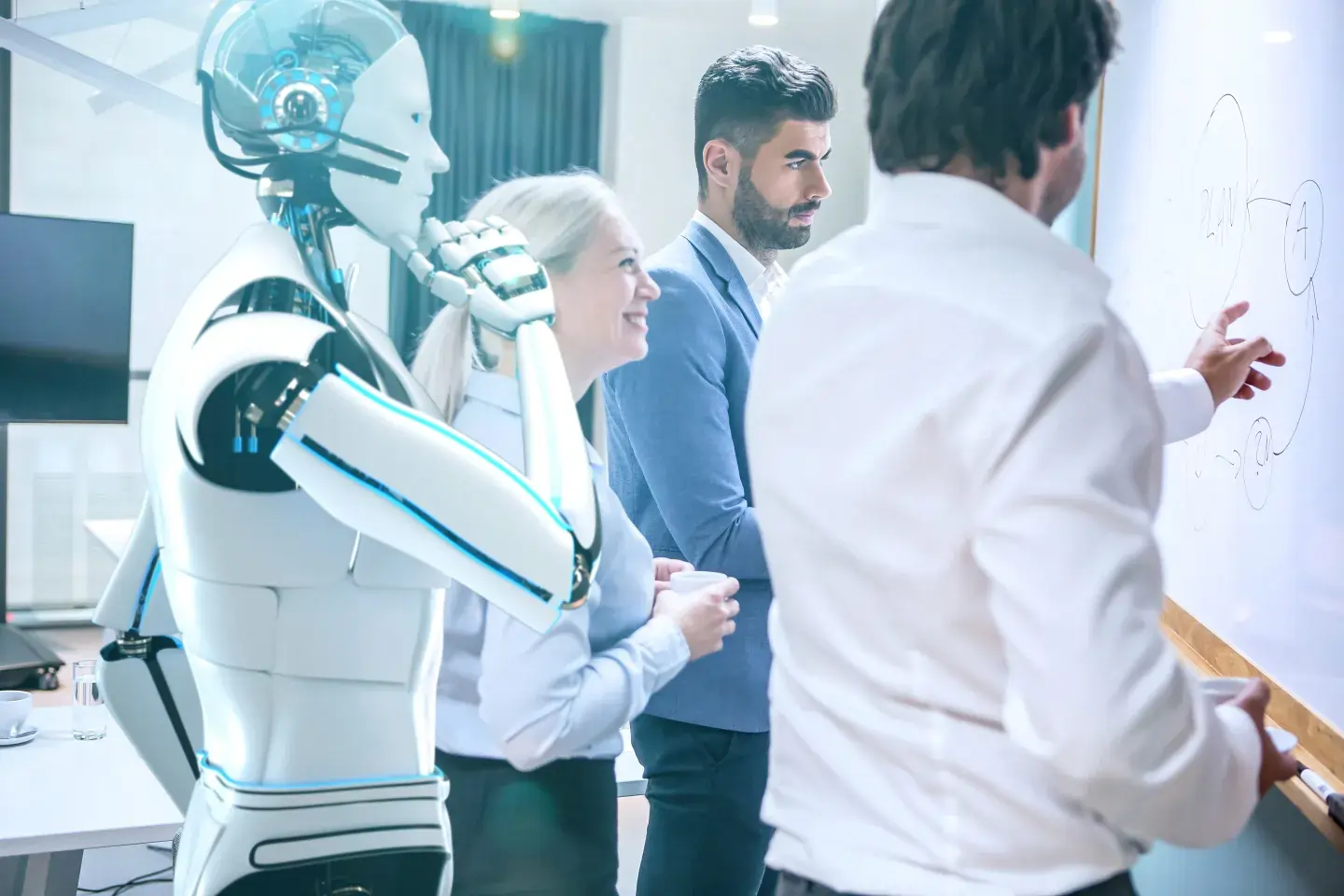Enterprise AI Agents: Redefining How Large Organizations Operate

Artificial Intelligence has already reshaped consumer tools and individual productivity, but the next frontier is happening inside large organizations. Enterprise AI agents are redefining how companies operate by acting as intelligent, autonomous systems that manage workflows, analyze data, and make decisions across entire business ecosystems.
Unlike chatbots or narrow automation scripts, enterprise AI agents are designed for scale. They are built to handle the complexity of multi-department processes, cross-platform integrations, and enterprise-grade compliance requirements. The result is a new class of digital teammate that extends far beyond task automation, unlocking strategic value across every corner of the organization.
What Are Enterprise AI Agents?
Enterprise AI agents are autonomous systems embedded within business workflows. They are capable of understanding objectives, planning steps, executing actions, and adapting to changes in real time.
Their defining qualities include:
- Goal-driven intelligence: Agents pursue outcomes, not just follow static rules.
- Cross-platform execution: They operate across CRMs, ERPs, communication platforms, and cloud applications.
- Scalable design: Built to handle thousands of simultaneous processes without breaking.
- Governed autonomy: Every action is logged, monitored, and aligned with enterprise security standards.
In short, enterprise AI agents are not assistants. They are organizational operators that can scale intelligence across departments.
Why Do Enterprise AI Agents Matter?
The enterprise environment is complex. Teams use dozens of disconnected tools, data lives in silos, and coordination across functions often slows execution. Traditional automation helps in pockets, but it lacks flexibility.
Enterprise AI agents solve these issues by:
- Eliminating silos: Agents bridge workflows across sales, finance, operations, and IT.
- Reducing overhead: Routine coordination and administrative tasks are handled autonomously.
- Improving accuracy: Agents follow data-driven logic, reducing errors in compliance-heavy processes.
- Enabling agility: Enterprises can adjust workflows quickly without rewriting scripts.
The outcome is a more connected, adaptive organization that can respond to opportunities and risks faster than competitors.
Key Use Cases of Enterprise AI Agents
The applications of enterprise AI agents span nearly every department. Some of the most impactful include:
Finance and Accounting
Agents process invoices, verify compliance, and reconcile accounts without human intervention. They can also monitor transactions in real time for fraud detection.
Human Resources
From automating onboarding to managing performance data, agents streamline HR processes that typically require hours of manual oversight.
IT and Security
Agents monitor system health, detect vulnerabilities, deploy patches, and escalate high-risk incidents to security teams.
Sales and Marketing
AI agents qualify leads, update CRMs, generate reports, and ensure campaigns flow seamlessly across platforms.
Operations and Supply Chain
From demand forecasting to order management, enterprise agents ensure smooth, end-to-end execution across suppliers, warehouses, and distribution.
How to Deploy Enterprise AI Agents in Your Organization
Introducing AI agents into an enterprise environment requires a structured approach. Here is a practical framework:
a) Identify High-Value Workflows
Focus on processes that are repetitive, cross-departmental, and error-prone. For example, customer onboarding or compliance reporting.
b) Set Clear Objectives
Define what success looks like. Is it reducing processing time by 50 percent? Eliminating manual data entry? Increasing compliance accuracy?
c) Map the Workflow Visually
Use diagrams to identify every step in the process and where agent intervention will create the most value.
d) Choose the Right Platform
Select a system designed for enterprise use cases, with capabilities like governance, cross-platform integration, and scalability.
e) Start Small, Scale Fast
Deploy agents in one department, measure outcomes, and then replicate across the organization.
f) Monitor and Optimize
Enterprise AI agents improve with feedback. Monitor their actions, review results, and refine workflows continuously.
The Difference Between Enterprise AI Agents and Other AI
Many organizations confuse enterprise AI agents with generative AI or robotic process automation (RPA). Here is how they differ:
- Generative AI creates outputs such as text, code, or images, but does not execute workflows.
- RPA automates repetitive rules-based tasks but breaks when conditions change.
- Enterprise AI agents are dynamic, goal-oriented systems that coordinate entire workflows and adapt in real time.
This distinction matters because enterprises require resilience and scalability. While generative tools and RPA have their place, only AI agents deliver end-to-end execution at scale.
Challenges to Consider Before Adopting Enterprise AI Agents
No transformation comes without obstacles. Enterprises deploying AI agents must address:
- Change management: Employees may resist shifting responsibilities to digital agents.
- Integration complexity: Legacy systems can create roadblocks.
- Governance concerns: Every action must meet compliance, security, and audit requirements.
- Skill gaps: Teams must learn how to design and manage workflows, even in no-code environments.
By anticipating these challenges, enterprises can adopt agents smoothly and ensure sustainable results.
How Burai Delivers Enterprise-Ready AI Agents
Many tools market themselves as “AI-powered,” but few are built for enterprise-grade complexity. Burai was designed from the ground up to enable intelligent, scalable workflows across large organizations.
Key differentiators include:
- Workflow Mapping Intelligence: Burai learns how teams actually work and adapts agents to fit real behaviors.
- Cross-Platform Execution: Agents integrate with Microsoft, Google, Slack, CRMs, ERPs, and other enterprise tools.
- Governed Autonomy: Every agent action is logged and aligned with organizational guardrails for security and compliance.
- Agent-First Design: Unlike platforms that bolt AI onto existing systems, Burai embeds agents at the core of execution.
For enterprises, this means Burai agents are not pilots or add-ons. They are trusted digital teammates operating at scale.
The Strategic Impact of Enterprise AI Agents
Adopting enterprise AI agents does not just make workflows faster. It changes the strategic posture of an organization. Companies that embrace agents will:
- Increase resilience by maintaining operations even during disruptions.
- Improve competitiveness by accelerating time-to-market for products and services.
- Enhance innovation capacity by freeing employees to focus on strategy instead of routine tasks.
- Retain talent by reducing burnout caused by repetitive, low-value work.
The organizations that move early will set the standards in their industries.
Future Trends for Enterprise AI Agents
Enterprise AI agents are still in the early stages of adoption, but the momentum is growing. Some trends to watch include:
- Multi-agent ecosystems: Agents collaborating across departments to achieve shared goals.
- Industry-specific models: Preconfigured agents built for finance, healthcare, or logistics.
- Self-improving agents: Systems that optimize workflows automatically without manual adjustments.
- AI as a workforce layer: Viewing agents as part of the organizational structure, with defined roles and KPIs.
These trends highlight that enterprise AI agents are not just a temporary trend but the future backbone of intelligent business operations.
Final Thoughts: Agents as the Foundation of the Enterprise
Enterprise AI agents represent the next leap forward in business technology. They move beyond task automation and content generation to provide real, adaptive, goal-driven execution across entire organizations.
Companies that embrace them now will operate with greater agility, stronger resilience, and higher productivity than their competitors. Those that wait risk falling behind as agents become the new standard for enterprise operations.
💡 Ready to see how Burai enables enterprise AI agents to transform disconnected processes into seamless execution? Request a demo today and explore how we make intelligent workflows deployable at scale.



